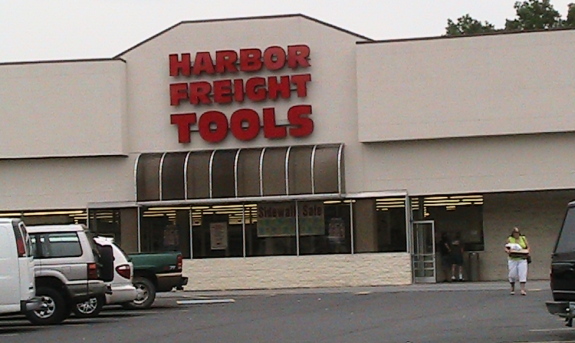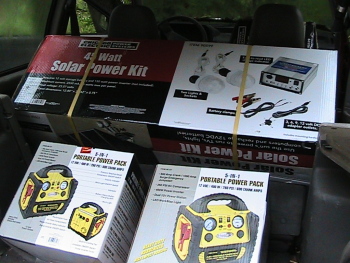
Harbor Freight review

 Harbor
Freight in Johnson City is an awesome store!
Harbor
Freight in Johnson City is an awesome store!
The manager was in a good
mood and gave us the additional 2 year warranty on each solar power kit
along with the portable power packs.
Stay tuned for more details
as I unbox and set up this new
technology.
Want more in-depth information? Browse through our books.
Or explore more posts by date or by subject.
About us: Anna Hess and Mark Hamilton spent over a decade living self-sufficiently in the mountains of Virginia before moving north to start over from scratch in the foothills of Ohio. They've experimented with permaculture, no-till gardening, trailersteading, home-based microbusinesses and much more, writing about their adventures in both blogs and books.
Want to be notified when new comments are posted on this page? Click on the RSS button after you add a comment to subscribe to the comment feed, or simply check the box beside "email replies to me" while writing your comment.

As excited as I am to try our new solar panels, it's too wet outside put it together. So I instead decided to crunch the numbers on a slightly different solar setup that is probably more relevant to most of our readers. A good portion of the cost for our system is the charge controller and power pack that will enable us to use it as a backup, but if someone's just interested in lowering their electric bill while spending no more than a few hundred bucks, is this system cost effective?
We went ahead and ordered a 300 watt grid tie power inverter from Ebay for $90. This inverter, plus the panels, should be all we would need to sell electricity back to the grid. So, two 45 watt solar panels and the grid tie inverter would cost $430. Take out the 30% tax credit that we'll receive (applicable to anyone who pays taxes), and it would really have cost us $301.
I estimate we'll get about 148 kilowatt hours per year from our two solar panels (figuring that we get an average of 4.5 solar hours per day through the year to take into account the summer highs and winter lows, as well as clouds, etc.) Of course, this is the part of the figure that will vary a lot --- if you live in Texas, your numbers will be better. If you live in Seattle, you should stop reading right now.
At our current electric prices (12 cents per kilowatt hour), that would give us $17.76 off our bill every year. If rates stay level, we would need to have the solar panels operational for 17 years before they will pay us back. Many websites say that crystalline solar panels will last at least 20 years before you see a serious degradation in output, so we should make a little money if all goes well and our panels don't break prematurely. On the other hand, if electricity rates skyrocket, the way many peak oilers suggest, we would make more money. (On the negative side, if Huckleberry jumps on the panels and messes them up, we could lose the whole shebang.)
This financial side isn't the reason we got the panels --- we just got sick of sitting here in the dark during our monthly power outage. But it's nice to know that the panels probably make financial sense, and that you can sink as little as $300 into a system and still see the solar panels pay for themselves.
i could be wrong, but isn't the power for that setup stored in a battery? if so, it will need to be replaced every 5 years or so. also, have you confirmed with your local electric company that they will buy back your electricity? i move around a lot, and i've noticed some places won't, or if they do, they don't offer the same price as they charge. personally, i think tying into the grid is too big of a hassle, it usually requires permits and inspections by the electric company, but i'm not very handy.
as for peak oil, my hubby works in the oil industry and says there is no threat of peak oil. more oil beds are being found all the time, most recently one that runs from south america all the way to africa. hope that eases some worries.
p.s. love your website, it's so awesome!
Well, someone who works for an oil company isn't exactly going to tell you that they're running out of oil, are they? Their share price would plummet if investors thought their business was drying up. They'll tell you everything is OK, just keep buying our oil.
Just like I wouldn't expect someone from a big bank to tell you that they've made way too many risky loans and are going to lose lots of money :-).
I'm talking about an alternative system in the comment above. Our primary goal when putting together our system was to have a battery backup for use during power outages, and we did buy a power pack to take care of that situation. In the comment, though, I'm talking about a slightly different situation that I think might be more relevant to people who don't live in highly forested areas and thus have several power outages a year. I was suggesting that people in more suburban situations could buy the same solar panels we bought, with a grid tie inverter (which we've also bought to use during non-outage situations), and use the two together as a simple way to lower your electric bill without bothering with the battery (that will need to be replaced.) That way, the only parts that will wear out are the solar panel (presumably after a couple of decades) and the grid tie inverter (longevity unknown, but presumably longer than a battery.) I hope that makes sense.
We live in Virginia, which is one of the states where the electric company has to buy back our power. However, more research does suggest that you're right and we'd need to get the grid tie inverter permitted. Drat --- that sounds like a pain.
I don't have a stance one way or another on peak oil --- I haven't taken the time to research it.
Thanks for the kind words about our website!
The utility is required to buy back your generated electricity, though you have to meet safety requirements. If your state/utility provider has net metering, they are required to buy electricity back at the rate they charge customers (this can be on an average basis or whatever the cost is at that instant in time) but if they don't have net metering they'll pay you the rate equivalent to that of their cheapest producing unit (baseload) and it will be a fraction of that cost, maybe 4 cents per kwh.
Looking forward to hearing how your new system works out.
Darren --- I was refraining from making that point about the oil company --- it didn't seem very polite. My general feeling is that energy surely isn't going to get cheaper. But I haven't done enough research to know whether I really believe in what some of the more serious peak oiler's suggest --- that our society will basically crumble due to skyrocketing energy prices.
My general feeling is that energy surely isn't going to get cheaper. But I haven't done enough research to know whether I really believe in what some of the more serious peak oiler's suggest --- that our society will basically crumble due to skyrocketing energy prices.
Lisa --- Good information on the difference between net metering and not. I didn't realize that even without net metering the utility had to buy back the electricity, but that you just didn't get a good deal.
The degradation of solar panels is a slowly progressing process. Usually the 25-30 year (or whatever) figure is when the panels lose e.g. 15% of their power output. I'm guessing that the degradation is a lineair process, but it might also be cumulative. Corrision of the contacts is one thing to look out for, certainly in wet conditions, so keeping the modules sealed is important.
BTW, when you put up the panels keep in mind that you have to keep them clean for the best performance. That means wiping off the snow in winter, but also wiping off the dirt or rain residue year round. And make sure no shade falls on the panel. Even shading a single cell can have a big effect because they are wired in series.
Does your kWh figure include storage and conversion to AC losses? Good batteries can be quite efficient, but you'll probably still lose 10-20% of the energy you put in the batteries. The efficiency of the AC converter will probably depend on the load, but it certainly isn't 100%. And unfortunately the losses are cumulative. If both the batteries and the invertor are 90% efficient, by the time you plug in your laptop, you've only got 81% of the solar power left.
WRT fossil fuel prices, there are still known reservoirs of oil and gas that are currently not economically viable, because it would cost more to get the stuff out and distributed than it would sell for. As prices go up, more and more of those fields will become viable. Even so I think we should look and work towards renewable alternatives for hydrocarbons (which are just so useful) in the form of biomass etc.
Harbor Freight was a ripoff two years ago, and is still a ripoff, even with a coupon. What are they now, about $3 or $4 per watt?
Well, how about less than $1/watt (5-year payoff)!!!
Check this out (a good-priced web site I found with Google - I have no relationship with them) - 78 cents per watt!!! Yeah, there's a minimum of 10 panels, but still less than $2k for over 2KW. I've seen lower minimum qtys on eBay for 99 cents/watt for panels, and 50 cents/watt for individual cells - Sweet!!!
http://www.civicsolar.com/solar-panels